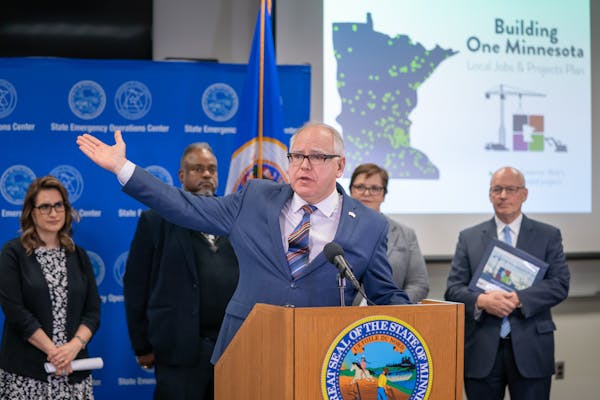Eight months after Republican lawmakers spurned his proposed gas tax, Gov. Tim Walz is challenging legislators to come up with new ways to pay for aging roads and bridges around the state.
The DFL governor opted not to draw extensively on borrowing to pay for state highways and other large-scale transportation projects as part of a $2 billion public infrastructure bonding package he presented last week.
"That is going to require a comprehensive transportation bill," Walz said. "And if you're going to come to the Capitol as a legislator, have the courage to do your job. Don't kick the can down the broken road."
Last session, Walz proposed a 20-cent-per-gallon increase in Minnesota's gas tax, an idea that Republican legislators quickly rejected. He said that in the session that starts Feb. 11, he doesn't want to rely too heavily on one-time dollars from the state's surplus or borrow too much money for the expensive transportation needs throughout the state.
That doesn't mean transportation was left out of his bonding package. He included $112 million for local bridge projects and $100 million for local roads, which some Republican legislators applauded.
"That's a nice number and I'd like to see that myself, and we'll honestly aspire to get close to that," said Sen. Dave Senjem, R-Rochester, chairman of the Capital Investment Committee.
Existing gas-tax dollars help fund the state highway system and shouldn't be used for those local street projects anyway, said Senjem, arguing that bonding is an appropriate way to pay for those needs. He expects Senate Republicans' bonding proposal will emphasize local roads and bridges.
However, he plans to talk with fellow legislators about using cash from the state's projected budget surplus to fund one-time infrastructure improvements.
"If I were king, I would take all of the so-called $1.3 billion surplus and not have a bonding bill, have a cash capital investment bill," Senjem said. He estimates that approach would save the state about $700 million on debt service payments over 20 years.
Others are more cautious about the idea of spending too much of that budgetary cushion.
House Republicans will be pushing to use the extra money for tax relief, said Rep. Paul Torkelson of Hanksa, the ranking Republican in the House Transportation Committee. But he said if there are pressing transportation issues, he would advocate using some of the surplus money, an idea that concerns some Democrats.
The surplus dollars are part of the state's general fund and should not be used to cover transportation demands, said House Transportation Committee Chairman Frank Hornstein. He, like Walz, wants another long-term dedicated revenue stream for roads and bridges.
Hornstein, DFL-Minneapolis, said he appreciates that Walz's plan doesn't lean too heavily on trunk highway bonds, a specific type of borrowing that is devoted to certain road projects. Walz included $172 million of trunk highway bonds in his proposal. The bulk of that, $110 million, would go toward fixing railroad crossings by adding bridges and underpasses.
"There would be a temptation just to float lots of trunk highway bonds in place of a gas tax," Hornstein said. "We don't want the bonding bill to become a transportation finance bill. There's a certain amount that's appropriate, but it can't be this substitute for what we did not accomplish last year."
If Democrats want to pass a gas-tax increase, they are going to need to build a bigger base of support for the idea in greater Minnesota, said Senjem, adding that the increase is not going to happen during an election year.
"If I go to a meeting and I ask people if they want an increase in gas tax, it's almost resounding on 'No,' " he said.
Walz said he is not trying to pressure legislators to pass a gas tax but instead wants to push them to offer alternatives to pay for continuing needs like the thousands of bridges around the state that need to be replaced or rehabilitated.
"I put my proposal forward. That was rejected and sent back. That's fine. Now we need a new one," Walz said.
House Minority Leader Kurt Daudt, R-Crown, reiterated an idea he and other Republican legislators have pushed in recent years: redirecting the sales tax on auto parts and vehicle rentals. Part of the revenue from that tax helps support the state's general fund, but Daudt said 2020 "is the year to finish that job" by dedicating all of the proceeds specifically to roads and bridges.
Torkelson, however, said that seems unlikely to pass in the 2020 session, but it could happen in 2021. And unlike the gas tax, Torkelson said he hasn't heard a strong negative reaction to the idea. He also suggested expanding a fee on electric and hybrid vehicles as another source of transportation revenue.
Long-standing arguments are poised to continue this session over how to pay for transportation needs and how much money the state should borrow for infrastructure. But some transportation-related pieces of Walz's borrowing plan do appear to have bipartisan support — like the idea of spending $55 million on bus rapid transit.
"We strongly support and I think we could even go higher on that," said Hornstein. His Republican counterpart, Torkelson, said, "The idea of expanding on BRT is something I think most of my colleagues and I certainly support."

Minnesota State Patrol celebrates diverse new class of troopers

Records: Former Minneapolis police oversight head disparaged women, threatened staff
Video goes viral of man enduring 'shocking' chain whipping on downtown St. Paul street
Minnesota sales, clean-ups and other events to celebrate Earth Day and Arbor Day

